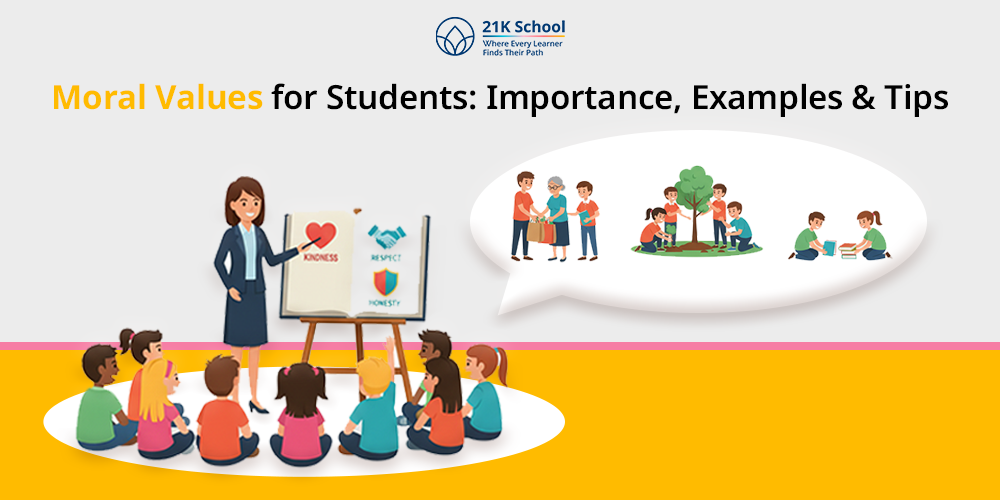
Education in students’ lives is not limited to solving maths problems, learning about history or exploring new science experiments.
A true education ensures the balance of both learning and shaping character and behavior in society. To do so, understanding moral values is important.
Moral values help learners to understand what is right and wrong and how to take positive steps to overcome any challenge. Students with knowledge and moral values succeed in studies to become better humans and future representatives of society.
This blog helps parents and facilitators to guide learners the importance of moral values in students’ lives. Also, highlighting the key examples and tips to implement effectively.
Table of Contents
What Are Moral Values for Students?
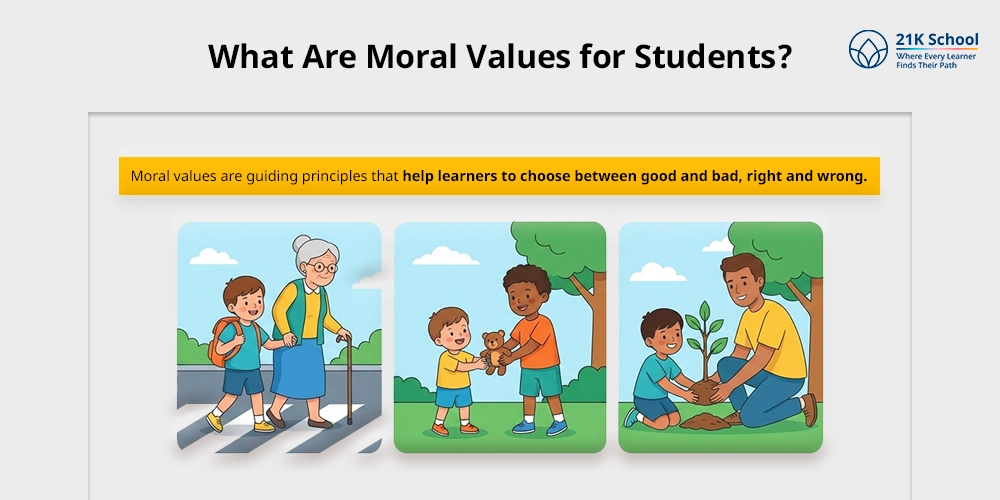
Moral values are guiding principles that help learners to choose between good and bad, right and wrong. To build personal character and behaviour improvement moral values are important.
From a young age implementing the basic moral values like honesty, respect, responsibility, empathy, compassion, integrity, perseverance, gratitude, and self-discipline ensures the development of a child.
10 Moral Values for Students
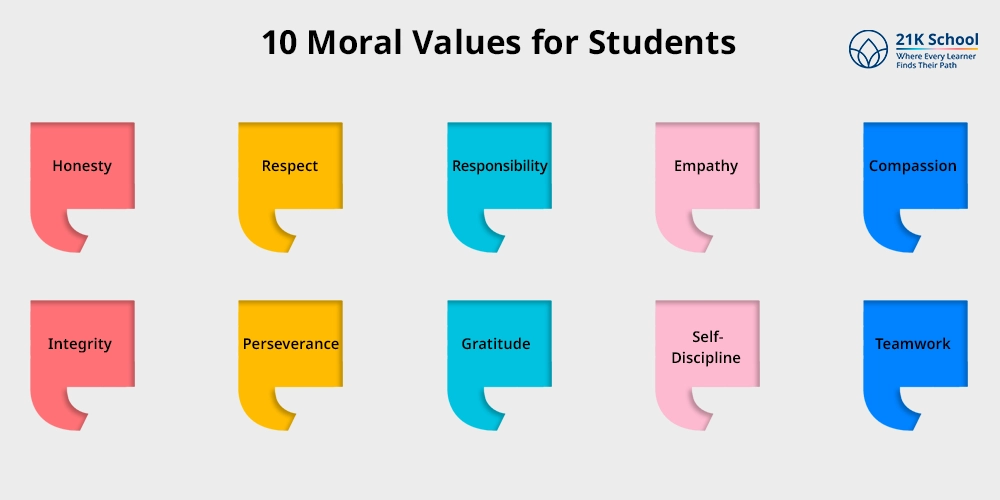
Given below are top 10 essential moral values beneficial for students growth and development.
1. Honesty:

Honesty refers to transparent truth that can be seen in verbal or actions of an individual. Students with honesty never lie or cheat other individuals.
For example, admitting delay to reach the classroom instead of making wrong excuses.
2. Respect:
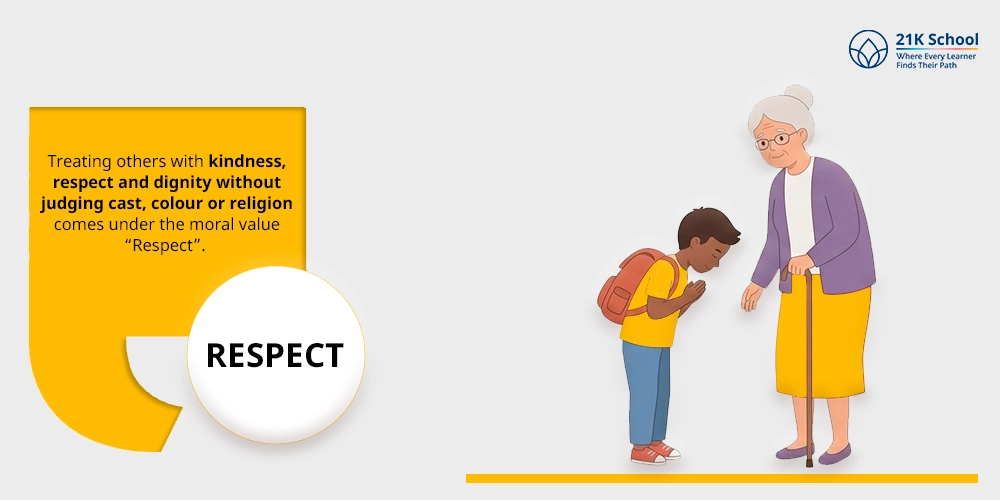
Treating others with kindness, respect and dignity without judging cast, colour or religion comes under the moral value “Respect”.
Examples such as listening to a facilitator or peer with concentration.
3. Responsibility:

Responsibility means an individual taking his or other accountability of fulfilling any promised task or action timely.
For example, completing the homework after the class or helping parents in home related work.
4. Empathy:
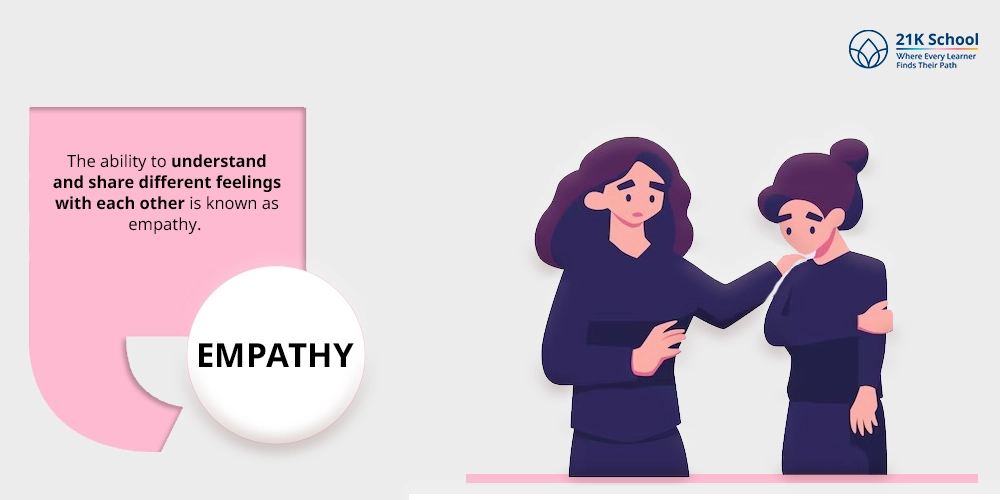
The ability to understand and share different feelings with each other is known as empathy. It has to connect one person with another emotionally.
For example, supporting classmates who feel alone or having exam stress.
Explore how to develop empathy in a child.
5. Compassion:
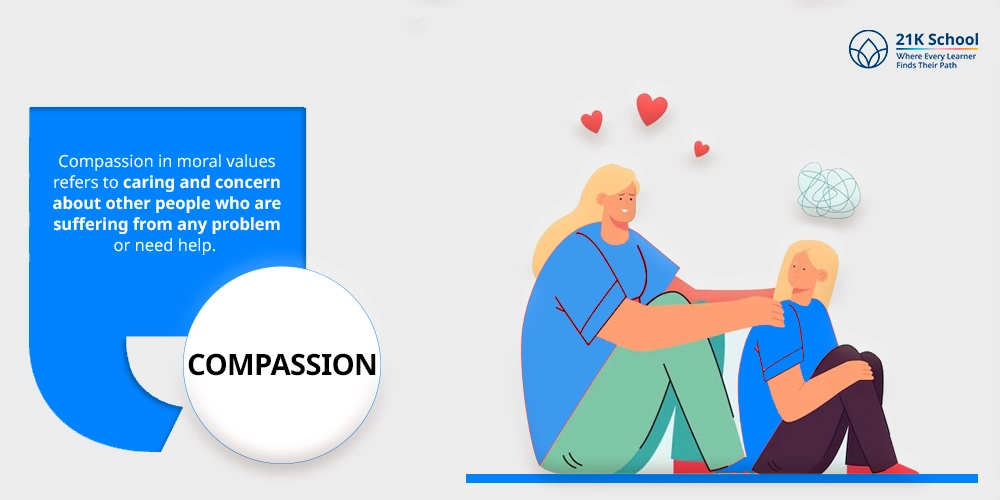
Compassion in moral values refers to caring and concern about other people who are suffering from any problem or need help.
For example, taking part in school charity by providing amenities.
6. Integrity:

Integrity in moral values refers to working on the true and right path even if no one is watching or judging. It builds trust and self-acceptance to become good.
For example, avoiding copying answers in the classroom.
7. Perseverance:

Perseverance is a crucial moral value for each learner which helps them to be determined and never give up no matter what challenges are.
For example, taking part in a 500-meters race every year on sports day to win.
8. Gratitude:

A thankful and appreciating behaviour towards another person is known as gratitude.
For example, giving a farewell or thank you note to a facilitator who teaches throughout the year.
9. Self-Discipline:

Self-discipline refers to individual control over his or her action, emotion and habit to achieve the desired goals.
For example, studying until the homework is not finished.
10. Teamwork:

Teamwork refers to working together to achieve a common goal and handling each other’s drawbacks to become strong.
For example, working on a common science experiment in the lab for successful results.
Importance of Moral Values for Students
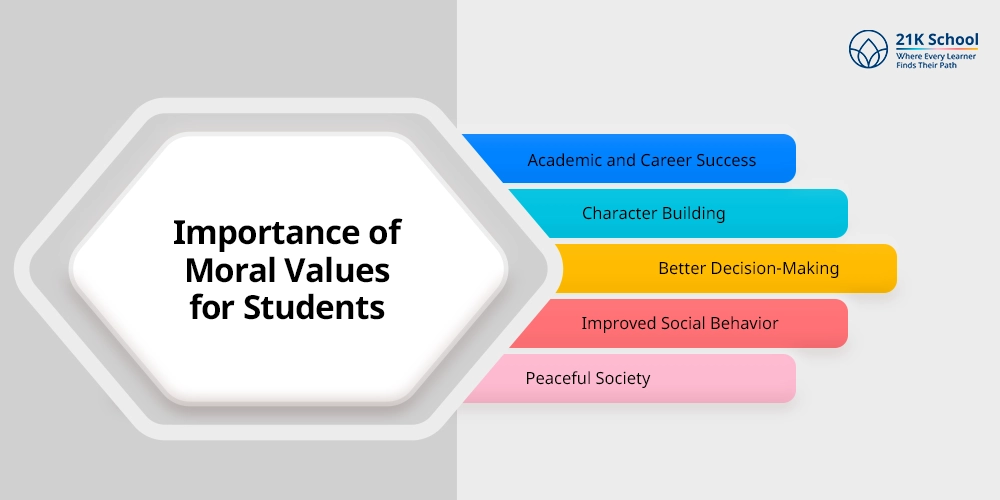
In students lives, moral values play an important role which helps them throughout the life for both academic and personal growth.
Below are some points explaining the importance of moral education for students:
1. Academic and Career Success

Learners who are honest, disciplined, responsible and respectful towards others can build a successful career in future. These moral values help create a good environment for everyone in school and classroom.
2. Character Building
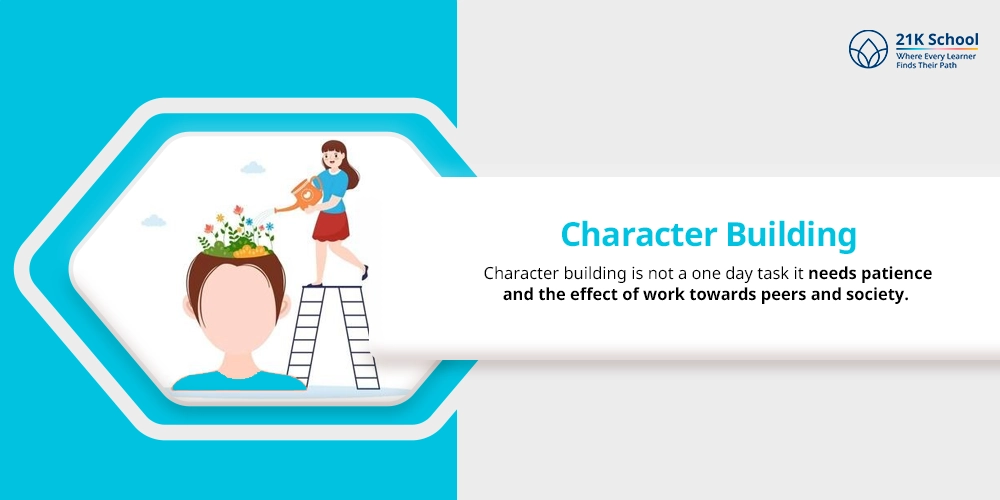
Character building is not a one day task it needs patience and the effect of work towards peers and society.
Moral values help in shaping individual character in school, classroom, home and other gatherings.
3. Better Decision-Making

Learners face many challenges related to both academic and personal.
However, moral values help them to stay calm and find the best possible solution by understanding the correct and wrong path.
4. Improved Social Behavior
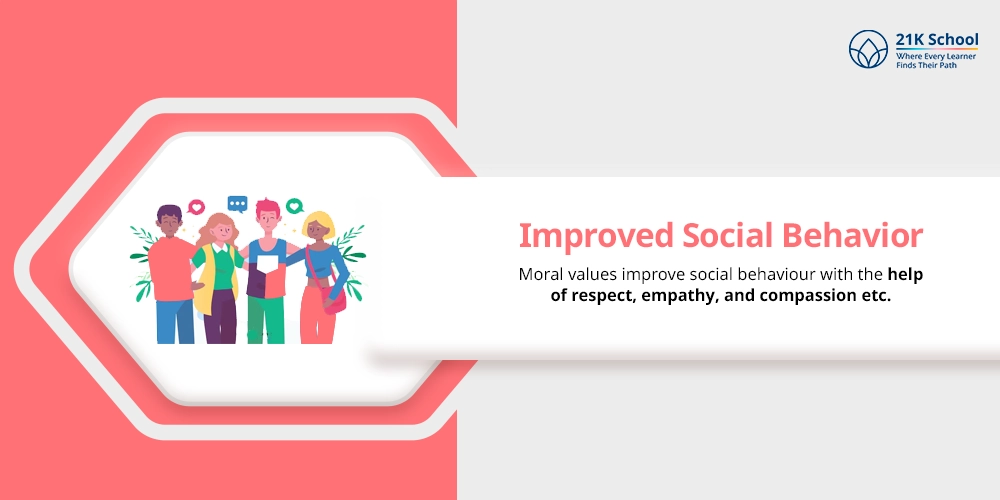
Moral values improve social behaviour with the help of respect, empathy, and compassion etc. These values are ideal to foster connection and long term relation with peers and facilitators.
5. Peaceful Society

To increase harmony, justice and peace in the society, passing moral values from generation to generation helps to build a strong environment for everyone, especially young kids.
Moral Values for Students: Role of Parents and Teachers
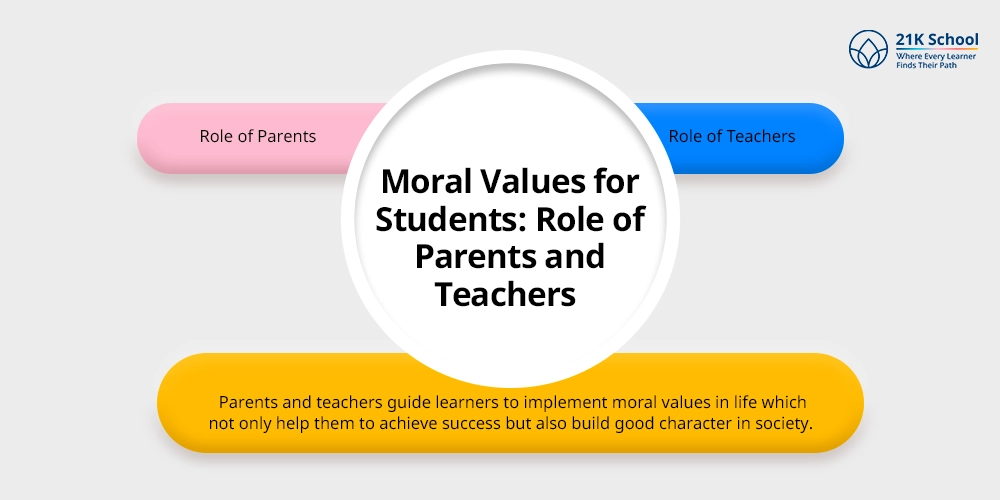
Parents and teachers guide learners to implement moral values in life which not only help them to achieve success but also build good character in society.
Given below are detailed information how parents and teachers shape students life:
1. Role of Parents
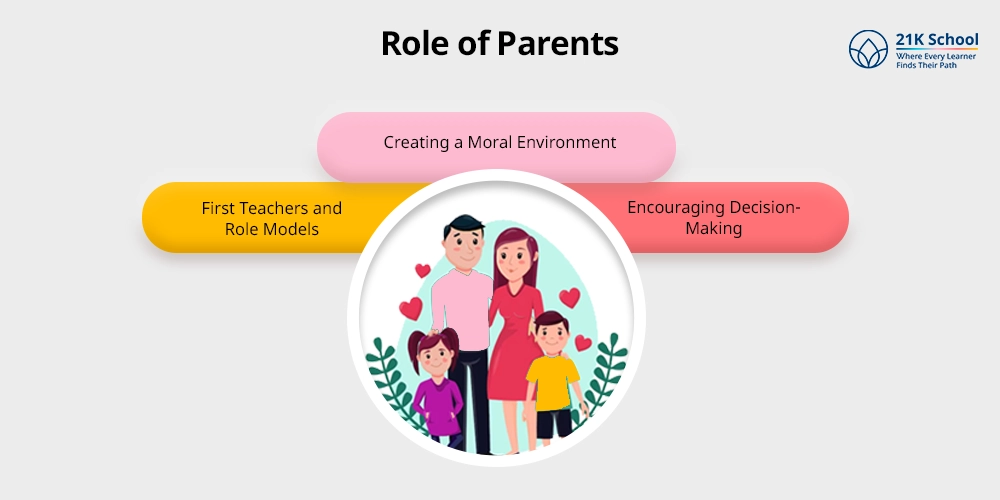
1.1 First Teachers and Role Models
The first teacher and role model of any child is their parents. Most of the time children watch and learn from parents. So, it’s important to give them a good example.
1.2 Creating a Moral Environment
A supportive environment at home which includes honesty, respect, love and kindness help children to explore good things and implement in future also.
1.3 Encouraging Decision-Making
Parents should let their children make small decisions from right and wrong. And guide how to walk on the right path.
It helps them to understand the difference and become accountable and responsible for their decision.
2. Role of Teachers
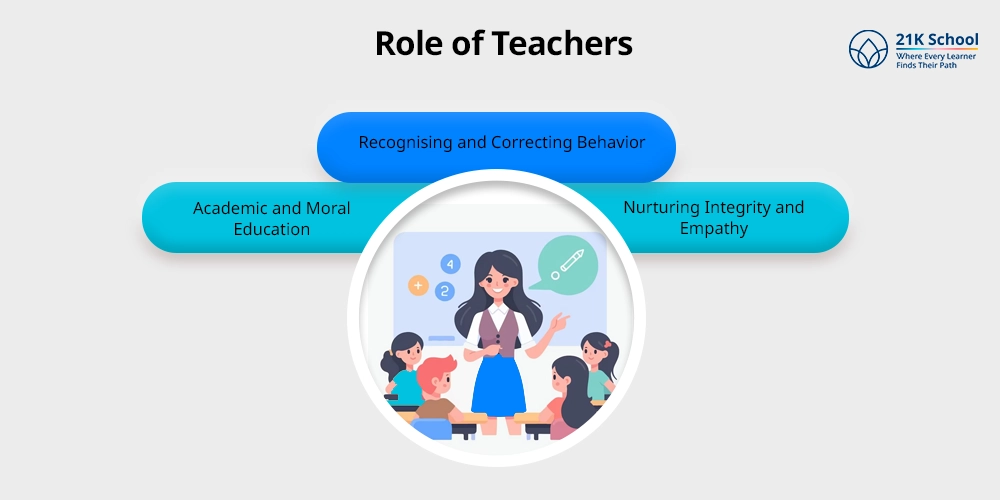
2.1 Academic and Moral Education
Teachers are not only responsible for teaching textbook chapters but also help them with ethics, discipline, and cooperation.
2.2 Recognising and Correcting Behavior
By identifying negative behaviour or wrong decisions of students can be helpful to manage and provide constructive correction.
2.3 Nurturing Integrity and Empathy
Through different educational activities such as storytelling in learning, classroom discussion, debate, role play etc learners can interact with each other through which teachers can implement honesty, dignity and respect.
Challenges and Solutions in Teaching Moral Values
While implementing moral values, students, parents and facilitators can deal with various challenges or problems.
Let’s go through some common challenges and solutions to implement moral values effectively:
1. Challenges
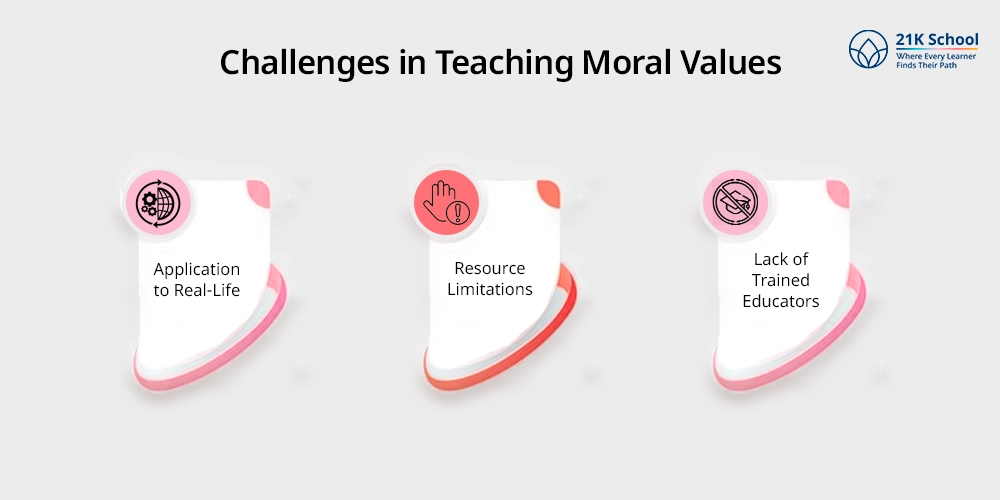
1.1 Application to Real-Life
Many students find difficulty to implement moral values in real life situations after learning in school.
1.2 Resource Limitations
Not all schools invest time, support and programs to implement moral values as a different subject.
1.3 Lack of Trained Educators
Due to the lack of trained educators it’s difficult for learners to gain enough knowledge and tips to implement effectively.
2. Solutions
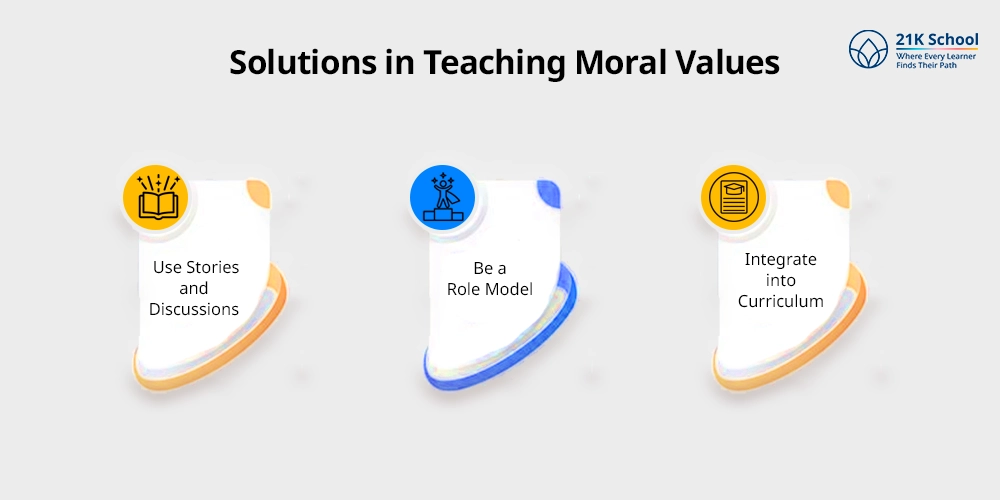
2.1 Use Stories and Discussions
Facilitators and parents can use storytelling discussion or presentation to explain the detailed example of implementing moral values in life.
2.2 Be a Role Model
By becoming role models and working with honesty, integrity and responsibility guide them to implement the same in future.
2.3 Integrate into Curriculum
Integration of moral values in learners standard curriculum, fun learning activities and daily learning helpful in engaging students without hindering their study schedule.
Tips to Instill Moral Values in Students
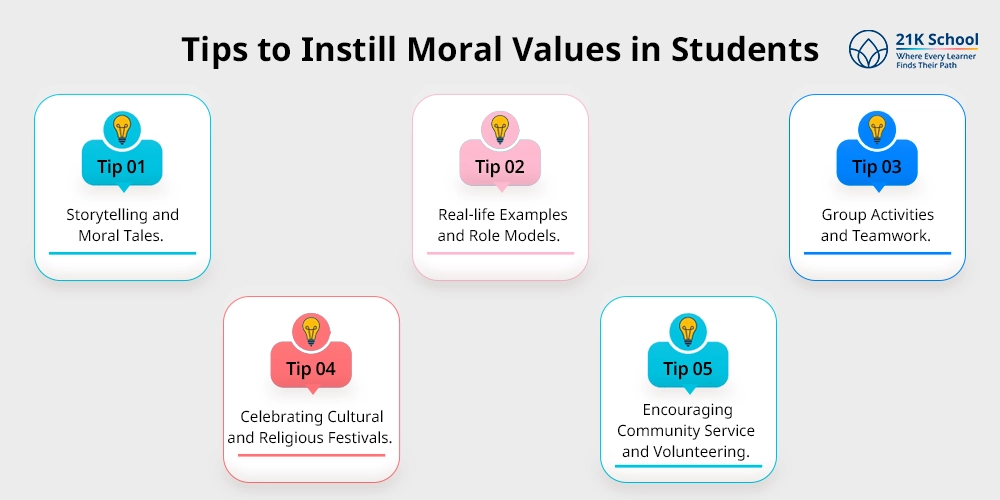
Instilling moral values in students’ daily activities promote strong character development, improve decision-making skills, and foster positive social interactions and relationships.
1. Storytelling and Moral Tales
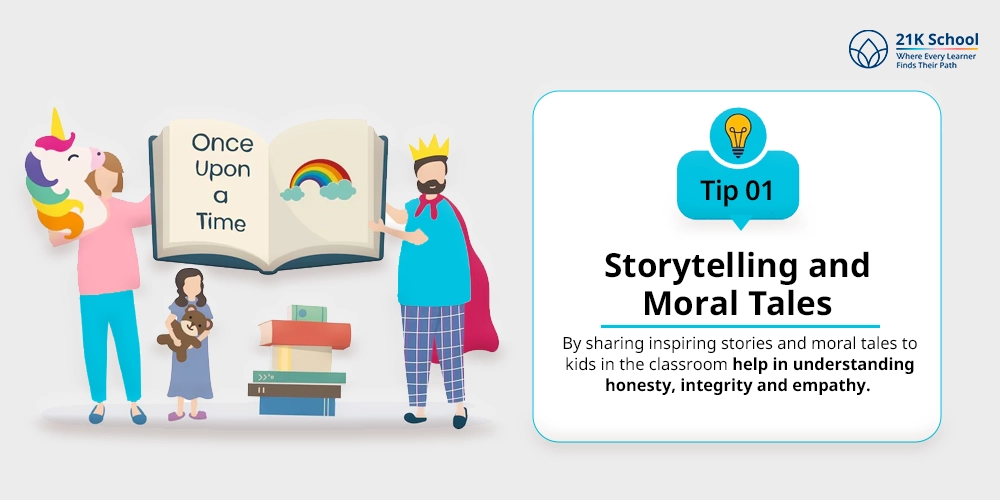
By sharing inspiring stories and moral tales to kids in the classroom help in understanding honesty, integrity and empathy.
2. Real-life Examples and Role Models

Various real life examples and role models such as teachers, parents, leaders, social workers are ideal to showcase why implementing moral values are important.
3. Group Activities and Teamwork

With creative activities in a group ensure learners can connect and build empathy, good relationships to create a positive learning environment in the classroom and outside.
4. Celebrating Cultural and Religious Festivals

By celebrating each other’s culture and festivals showcase the equality between different religions, caste and colour. By this way learners can gain the benefit of learning a second language, adapt and respect each other’s uniqueness.
5. Encouraging Community Service and Volunteering

Participating in social services, volunteering for Charity or any other kind of societal improvement like planting trees are an ideal step to embrace moral values not only living but non-living things.
Conclusion
In students’ lives moral values are equally important as academic learning. It directly helps kids to build personality, character and good behaviour.
The role of parents and teachers work as a role model who teach how to implement and use moral values.
As a parent and facilitator must include the above mentioned top 10 moral values in a learner’s life to improve both academic and personal growth.
In the world of grades and future career, moral values are a reminder that education must need honesty, respect, responsibility, kindness, empathy, gratitude, courage, self-discipline, cooperation and fairness.
